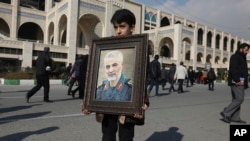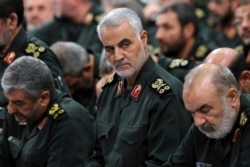A U.S. drone strike that killed Iran’s top general, Qassem Soleimani, at Baghdad International Airport in January is a violation under international law, according to U.N. report Thursday.
Investigator Agnes Callamard said more than 100 nations have an active military drone inventory and about a dozen allegedly have deployed armed drones for the use of force, such as targeted killings.
The uncontrolled proliferation of armed drones poses a threat to international peace, she added, and the U.S. killing of Soleimani has elevated the dangers. She noted the U.S. carried out its attack without first obtaining Iraq’s consent, thereby violating Iraq’s territorial integrity.
“That is a significant and troubling new development," Callamard said. "It is the first known incident in which a state invokes self-defense as justification for an attack against a government official outside a declared armed conflict.
“No evidence has been provided that General Soleimani specifically was planning an imminent attack against U.S. interests, particularly in Iraq, for which immediate action was necessary and would have been justified.”
Days after the drone attack, U.S. Secretary of State Mike Pompeo said Soleimani had “planned a broad, large-scale attack against American interests, and those attacks were imminent.”
Callamard countered that the U.S. self-defense argument is just a tipping point. She said Turkey has fully accepted the U.S. doctrine and other countries, including Britain, have expressed their support for it.
She told VOA she fears an increasing number of countries are likely to justify armed drone attacks by invoking the war on terror.
“So, my response to you is that if I were in the shoes of a government or member of the government who will be deemed a terrorist by the U.S., at this point, I would be wary and extra careful,” she said.
Callamard submitted her report to every country mentioned early in May. She said the U.S. has not responded.
Earlier this week, State Department spokeswoman Morgan Ortagus said, “It takes a special kind of intellectual dishonesty to issue a report condemning the United States for acting in self-defense while whitewashing General Soleimani's notorious past as one of the world's deadliest terrorists.”
The Iranian ambassador to the U.N. in Geneva, Esmaeil Baghael Hamanch, called Washington’s assassination of Soleimani brutal, arbitrary, unjust and unlawful.
He told the U.N. council the United States had committed an international crime of grave nature and must be held to account.





